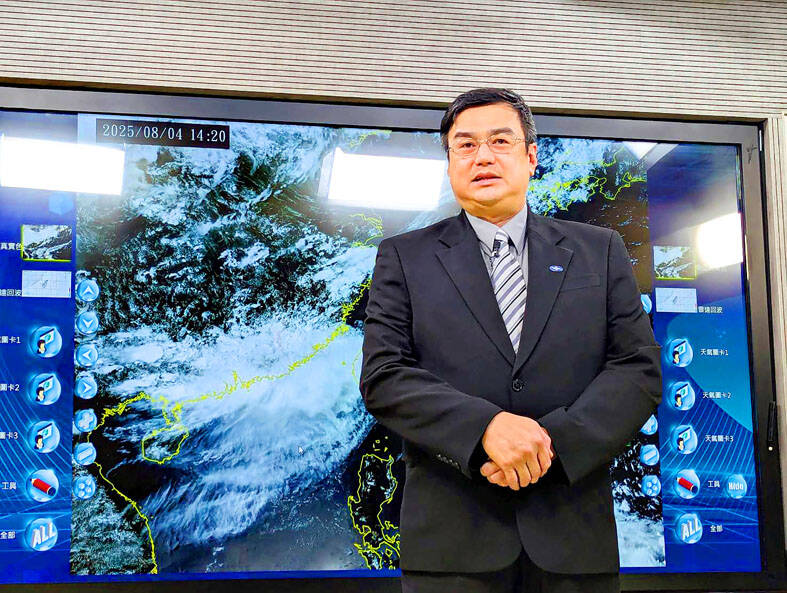Taiwan last week saw its first full week of “extremely heavy” rain since 1998, the Central Weather Administration (CWA) said yesterday.
The CWA defines extremely heavy rain as when 24-hour accumulated rainfall exceeds 200mm, or accumulated rainfall exceeds 100mm in three hours
The CWA made the statement during a news conference after lifting the week-long rain advisory it had named the “0728 Southwesterly Airflow Extremely Heavy Rain Incident.”

Photo: CNA
CWA Weather Forecast Center Director Chen Yi-liang (陳怡良) said that the week between Monday last week and yesterday was the first time since 1998 that observation stations in central and southern parts of Taiwan measured more than 200mm of rain every day.
Short bursts and extended rain blanketed the entirety of southern and central Taiwan, with 17 municipalities across Nantou, Yunlin, Chiayi and Pingtung counties, as well as Tainan and Kaohsiung, experiencing extremely torrential rain, he said.
During the week, certain areas saw torrential rain, with precipitation reaching more than 200mm in three hours, he added.
Such weather patterns lasted for five days straight in a number of locations in central and southern Taiwan, Chen said, adding that the accumulated rain came close to the record set by Typhoon Morakot in 2009.
Morakot set a record of 3,060mm over five days at Chiayi County’s Alishan Township, CWA data showed.
From Monday last week to yesterday 2pm, the most rain observed was 2,873.5mm in Kaohsiung’s Duona forest trail, the CWA said.
Chen said that rain reached torrential and “extremely torrential” levels in certain areas in two waves, the first from Monday to Thursday last week and the second from Friday to Sunday last week.
The main reason behind the week-long rain was the changes between strengthening and weakening southwesterly airflow above the Bashi Channel, he said.
The effects of the airflow were most prevalent between Wednesday and Thursday last week, when it covered central and southern Taiwan in significant rainfall.
Due to the decreased chance of large-scale and intense heavy rain, the CWA lifted the advisory of the week-long rain at noon yesterday.

Eight restaurants in Taiwan yesterday secured a one-star rating from the Michelin Guide Taiwan for the first time, while three one-star restaurants from last year’s edition were promoted to two stars. Forty-three restaurants were awarded one star this year, including 34 in Taipei, five in Taichung and four in Kaohsiung. Hosu (好嶼), Chuan Ya (川雅), Sushi Kajin (鮨嘉仁), aMaze (心宴), La Vie by Thomas Buhner, Yuan Yi (元一) and Frassi in Taipei and Front House (方蒔) in Kaohsiung received a one-star rating for the first time. Hosu is known for innovative Taiwanese dishes, while Chuan Ya serves Sichuan cuisine and aMaze specializes

Taitung County is to launch charter flights to Malaysia at the end of this year, after setting up flights to Vietnam and Thailand, the Taitung County Government said yesterday. The new charter flight services, provided by low-cost carrier Batik Air Malaysia, would be part of five-day tour packages for visits to Taitung County or Malaysia. The Batik Air charter flight, with about 200 seats, would take Malaysian tourists to Taitung on Dec. 30 and then at 12:35pm return to Kuala Lumpur with Taiwanese tourists. Another charter flight would bring the Taiwanese home on Jan. 3 next year, arriving at 5:30pm, before taking the

STATS: Taiwan’s average life expectancy of 80.77 years was lower than that of Japan, Singapore and South Korea, but higher than in China, Malaysia and Indonesia Taiwan’s average life expectancy last year increased to 80.77 years, but was still not back to its pre-COVID-19 pandemic peak of 81.32 years in 2020, the Ministry of the Interior said yesterday. The average life expectancy last year increased the 0.54 years from 2023, the ministry said in a statement. For men and women, the average life expectancy last year was 77.42 years and 84.30 years respectively, up 0.48 years and 0.56 years from the previous year. Taiwan’s average life expectancy peaked at 81.32 years in 2020, as the nation was relatively unaffected by the pandemic that year. The metric

Taiwan High Speed Rail Corp. (THSRC) plans to ease strained capacity during peak hours by introducing new fare rules restricting passengers traveling without reserved seats in 2026, company Chairman Shih Che (史哲) said Wednesday. THSRC needs to tackle its capacity issue because there have been several occasions where passengers holding tickets with reserved seats did not make it onto their train in stations packed with individuals traveling without a reserved seat, Shih told reporters in a joint interview in Taipei. Non-reserved seats allow travelers maximum flexibility, but it has led to issues relating to quality of service and safety concerns, especially during